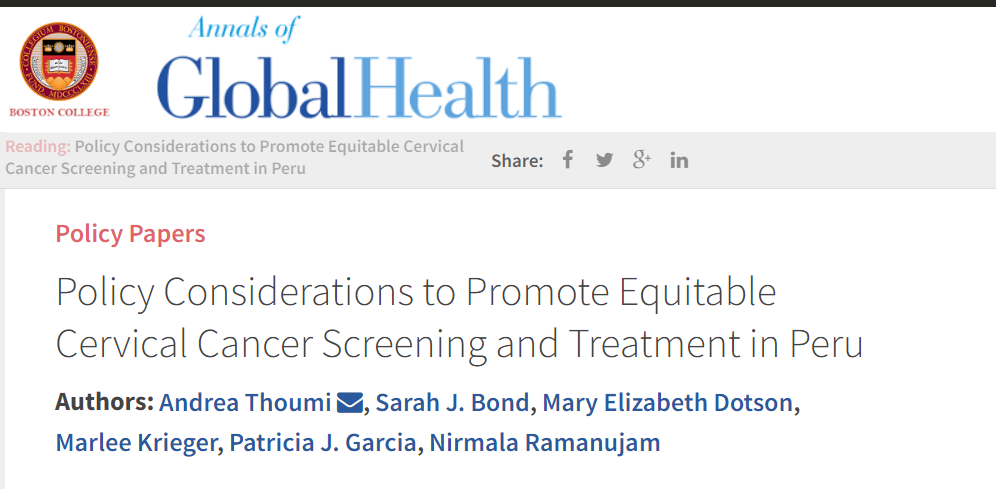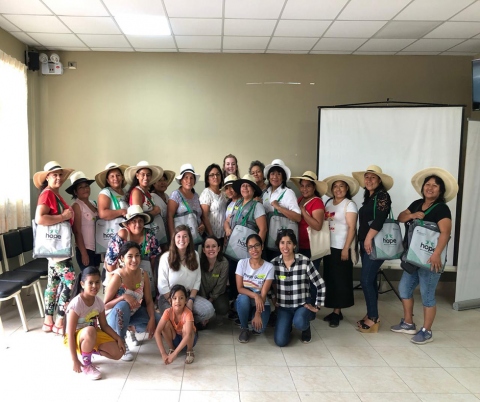Women-Inspired Strategies for Healthcare
Overview
Women-Inspired Strategies for Healthcare (WISH) is disrupting the status quo by empowering women to be at the center of the solution to eliminate cervical cancer, a preventable and treatable disease. Led by Duke Center for Global Women's Health Technologies, and in partnership with HOPE Peru (led by Dra. Patricia Garcia, former Minister of Health), Duke-Margolis is bringing expertise in health financing and health policy to analyze policy barriers to the uptake of implementing a see-and-treat model, propose policy and payment solutions, and design and implement a micro-costing and cost-effective analysis in Peru. In Peru, cervical cancer is the leading cause of death from cancers for Peruvian women in their prime reproductive and economic years. Our project aims to inform that national strategy for cervical cancer screening and treatment to save the lives of women.
In 2020, WISH was selected as a Top 100 Bold Solutions Idea in the MacArthur Foundation's 100&Change competition aimed to identify innovative ideas to solve critical social challenges. Learn more about the WISH Revolution, which includes work in Kenya, Costa Rica, Honduras, and India, here.
Funder: USAID, Duke Bass Connections

Policy Considerations to Promote Equitable Cervical Cancer Screening and Treatment in Peru
Andrea Thoumi, Sarah Bond, Mary Elizabeth Dotson, Marlee Krieger, Patricia J. Garcia, Nirmala Ramanujam, Annals of Global Health, November 2021
We conducted a policy analysis to identify enabling policy factors and barriers to cervical cancer screening and treatment in Peru to inform a national health policy agenda that prioritizes cervical cancer screening and treatment that is accessible among all women in Peru.

New hope for fixing health system failures to prevent and treat cervical cancer
Andrea Thoumi, Lilian Zhu, Rachel Mundaden, Karina Moreno Bueno, Brookings Future Development, April 2020
In March 2020, a team from Duke University’s Center for Global Women’s Health Technologies and Bass Connections program interviewed 20 CHWs to understand the community impact of HOPE in Pachacutec and Mi Peru, two peri-urban communities on the outskirts of Lima. Nearly 30 percent of the population live in poverty or extreme poverty, and many households lack basic services. Based on the interviews and prior work, technology-enabled community health opens up three pathways to advance women-inspired strategies for healthcare.
Duke-Margolis Team

Gavin Yamey, MD, MPH
Hymowitz Professor of the Practice of Global Health, Duke Global Health Institute
Margolis Core Faculty

Osondu Ogbuoji, MBBS, MPH
Assistant Research Professor of Global Health
Margolis Core Faculty

Mark McClellan, MD, PhD
Director of the Duke-Margolis Institute for Health Policy
Robert J. Margolis, MD, Professor of Business, Medicine and Policy
Margolis Executive Core Faculty

Nimmi Ramanujam, PhD
Robert W. Carr, Jr., Distinguished Professor of Biomedical Engineering
Margolis Core Faculty

Krishna Udayakumar, MD, MBA
Director of Post-Graduate Education Initiatives, Margolis Center
Associate Professor of Global Health and Medicine
Margolis Executive Core Faculty
Bass Connections Classes
Pocket Colposcope: Analysis of Bringing Elements of Referral Services to Community Care (2019 - 2020)
This Bass Connections project aimed to understand the logistics, efficacy and empowerment impact of an HPV and cervical cancer prevention peer-education model in Ventanilla, Peru. Team members interviewed and surveyed 20 community health workers (CHWs) from the HOPE Program in Ventanilla. Instruments included surveys based on relational empowerment and financial autonomy of CHWs in the HOPE Program. In addition, team members measured current barriers to screening to gain insight about the specific environment of Ventanilla.

Empowering Prevention of Cervical Cancer: Women-inspired Strategies for Health (WISH) (2020 - 2021)
Team members focused on three components: storytelling as a way to empower women to take control of their health; cost-effectiveness of interventions with respect to traditional models of care; and a policy framework for in-country adoption of the model.

Empowering Prevention of Cervical Cancer: Women-inspired Strategies for Health (WISH) (2021 - 2022)
The overall goal of this project is to reduce disparities in access to screening and treatment among low-income women in Peru. The project team will conduct evaluations of key implementation factors for long-term sustainability and scaling of the WISH model (cost-effectiveness, policymaking, community awareness/storytelling) for cervical cancer screening and treatment in Cajamarca, Peru.
